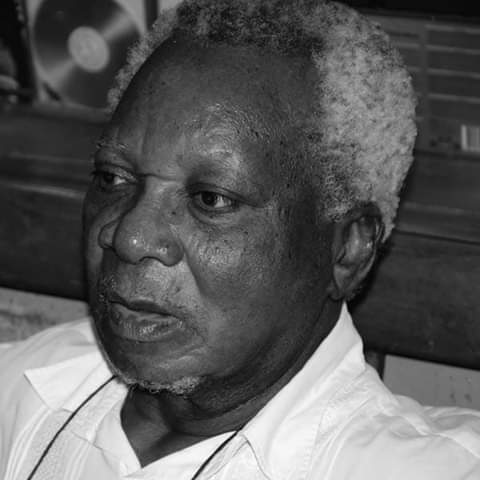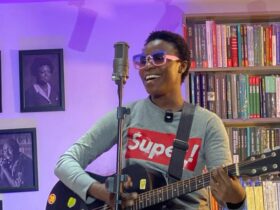Today, we lost him. A sad day for poetry, as someone said. Sad to have lost a man who scattered pearls and petals on the barren land of African literature

My first encounter with JP Clark (1935- 2020) was in my early years of high school. A collection of poems for junior secondary school students have three of his poems. I didn’t know which one I read first. Maybe it was Ibadan. I could remember pausing after reading it, you know the kind of pause to wonder how so much goodness and beauty can be packed in something so little, like holding a cute newborn in your arms. I read it again. I was new to poetry and that must have been the first time I chewed the meats of powerful metaphor and felt the spells of imagery. I dragged the poem to my Literature teacher. We discussed. He told me how in the University, a lecturer that taught them the poem took days extracting jewels from the words. I read it again and again. I rolled the words on my tongue as though it were Splash candy— “Running splash of rust and gold.”
I learnt about depth in poetry with Ibadan. I fell in love with Ibadan.
Two or so years later, I read Chimamanda Ngozie Adichie’s Americanah. A character in the book, Obinze, wanted to go to Ibadan because of the poem. I basked in the comfort that relatability in what a work of art can do to one provides . Ifemelu couldn’t understand. Ibadan is magic. It does magic to the reader.
I checked library shelves and found his play Ozidi and Mandela and Other Poems. I read every other Clark’s works I could find. I read his Abiku and remember loving it more than Soyinka’s Abiku. Yes, I was fascinated with Soyinka’s perspective and his portrayal of Abiku but liked Clark’s more. I read Night Rain. That was superb too. The innocence of the persona, the images of rain. I found myself in the poem written decades before I was born and it was a new and exciting experience for me— relating to a poem.
When I read his Riverbird, I was wowed. The style was new and seductive for me as a young poet. I wrote a poem with a similar style. When I presented it at a writers’ gathering, the moderator pointed out the similarities between mine and JP’s. He said I could be like Clark if I worked harder. It was very encouraging for me.
The Casualties by JP Clark
The casualties are not only those who are dead.
They are well out of it.
The casualties are not only those who are dead.
Though they await burial by installment.
The casualties are not only those who are lost
Persons or property, hard as it is
To grope for a touch that some
May not know is not there.
The casualties are not only those led away by night.
The cell is a cruel place, sometimes a haven.
No where as absolute as the grave.
The casualties are not only those who started
A fire and now cannot put out. Thousands
Are are burning that have no say in the matter.
The casualties are not only those who are escaping.
The shattered shall become prisoners in
A fortress of falling walls
The casualties are many, and a good member as well
Outside the scenes of ravage and wreck;
They are the emissaries of rift,
So smug in smoke-rooms they haunt abroad,
They do not see the funeral piles
At home eating up the forests.
They are wandering minstrels who, beating on
The drums of the human heart, draw the world
Into a dance with rites it does not know.
The drums overwhelm the guns…
Caught in the clash of counter claims and charges
When not in the niche others left,
We fall.
All casualties of the war.
Because we cannot hear each other speak.
Because eyes have ceased the face from the crowd.
Because whether we know or
Do not the extent of wrongs on all sides,
We are characters now other than before
The war began, the stay-at-home unsettled
By taxes and rumours, the looters for office
And wares, fearful everyday the owners may return.
We are all casualties,
All sagging as are
The cases celebrated for kwashiorkor.
The unforseen camp-follower of not just our war.
The Casualties was touching and I found humanity in its voice. It inspired my poems dealing with insurgencies. He’s lyrical and evokes landscapes that stays in the mind for a long time. I couldn’t find America, Their America. I loved the title a lot. I’m a lover of beautiful titles. I held the book in YELF library and read a few sentences. I still haven’t read the complete book.
Today, we lost him. A sad day for poetry, as someone said. Sad to have lost a man who scattered pearls and petals on the barren land of African literature then. Fare well, Papa.

Mujahid Ameen Lilo is a Nigerian teen author. He studies English and Literature at Ahmadu Bello University, Zaria. He was shortlisted for The Nigeria Prize for Teen Authors, longlisted for the Aminiya Trust Hausa Short Story Competition 2020 and won The Wole Soyinka Essay Competition.
- CALL FOR SUBMISSION: Dear Yusef: Essays, Letters, and Poems For and About One Mr. Komunyakaa - May 25, 2022
- #SubmitNow: Awaiting Revolution Poetry/Essay Anthology - May 21, 2022
- The Straight Path | Adamu Yahuza Abdullah - May 20, 2022













I wish J.P Clerk could read this. You should visit Ibadan one day. Adieu!